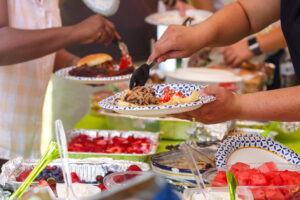 Eating brings pleasure, energy, and well-being to our lives. A disruption of this simple, often mindless, but important activity could lead to stress and anxiety.
Eating brings pleasure, energy, and well-being to our lives. A disruption of this simple, often mindless, but important activity could lead to stress and anxiety.
People who have food allergies have to be extra careful about what they eat. A simple ingredient such as eggs or nuts could ruin a meal by causing hives or wheezing, and, in extreme cases, cause a reaction so severe that an epinephrine injection is needed to save the person from a life-threatening condition.
Food intolerances, or adverse reactions to specific foods, can also cause harm to a person, but generally lead to minor symptoms such as diarrhea or stomach cramps, according to the National Center for Biotechnology Information website. Celiac disease, for example, is not a food allergy but rather an autoimmune issue. People with celiac disease who eat gluten experience health problems as a result.
Elika Kormeili, a therapist specializing in food-allergy issues and founder of the Center for Healthy and Happy Living, says that she has suffered from food allergies and knows the stress and anxiety they can cause. She says certain social situations that involve food, such as birthday celebrations or work lunches, can be so stressful that people with food allergies might avoid them entirely.
“Sometimes children with severe food allergies (life-threatening) are so scared of being exposed to an allergen that it impacts their ability to participate at school,” Kormeili said. She goes on to say that “Food is a huge part of our socialization and when you are limited in what you can eat, it definitely causes anxiety.”
Food allergies may lead to anxiety, but anxiety may or may not lead to issues with food allergies. Kormeili said stress and anxiety can weaken the immune system to the point of aggravating food allergies. People with food allergies might also experience changes in mood and behavior. Sometimes just getting on a diet to eliminate allergens improves mood, decreases irritability, and allows for better concentration.She has the following tips for coping with food allergies and the anxiety that sometimes follows:
- Make a list or keep track of the foods you are allergic to and make sure to remove them from your kitchen cabinets. Add foods that your body accepts.
- Develop steps to maintain good mental and emotional health, not just physical health. Mental and emotional self-care can involve relaxation and breathing techniques.
- Strengthen and maintain a healthy support group. You can interact with others in person or via social media.
- Ask for and accept help with your situation. Seeing a health professional or therapist is an option.
- Have a plan for emergency situations involving food allergies. If reactions to certain foods are severe, it may be necessary to carry an EpiPen—talk to your doctor about this—and create an action plan with specific steps. Alert others about what to do in such situations.
- Understand that despite prevention efforts, you still could be exposed to an allergen. Don’t let that keep you from living a happy, full, and healthy life.
Stacey Antine, a registered dietician and author of Appetite for Life: The Thumbs-Up, No-Yucks Guide to Getting Your Kid to Be a Great Eater, says that the most important part of alleviating anxiety associated with food allergies is having direct control over the food you’re eating. She encourages growing, harvesting, and cooking your own food. She is the founder of HealthBarn USA, which hosts workshops and other programs on a family farm to help kids and adults understand the importance of natural, healthy food.
She suggests cooking your own food, talking to servers at restaurants to get more information about the preparation and ingredients included in foods, carrying safe snacks to eat just in case, and informing others of your diet restrictions in advance so they can accommodate you. “Cook your own food and rely less on packaged foods. It’s better for your overall health…Also, yoga and at least 20 minutes of meditation daily will help reduce anxiety,” Antine said.
Laurinda Kwan, a naturopathic physician at Arizona Natural Health Care, says that she decided to focus on treating seasonal, environmental, and food allergies because of her own suffering from food allergies and eczema. “If you repeatedly have adverse reactions to your food, just like Pavlov’s dogs, you develop a learned response,” says Kwan. She goes on to say, “We are not born having anxiety to foods. However, over time, if eating food consistently produces unfavorable feedback (e.g., hives, itching, stomach pain), your learned response is going to be that of fear or anxiety to foods.”
She believes that in some cases anxiety itself could create food-intolerance issues. For example, when a person experiences anxiety, sometimes he or she also has gastrointestinal problems such as bloating, abdominal pain, and diarrhea. “If the gastrointestinal tract is compromised, this could lead to intestinal permeability (or ‘leaky gut syndrome’). When the intestinal lining is compromised, substances pass through the lining of the small intestine that normally should not pass into the blood stream, and your body creates an immune response,” Kwan said. She said to keep in mind that there is some debate about leaky gut syndrome, and more information needs to be gathered.
Kwan’s suggestions for alleviating anxiety associated with food allergies include talking to a homeopathic doctor who can treat the whole person, not just immediate physical symptoms. She also said it’s necessary to pay attention to food labels to avoid allergens.
Anxiety is not the only mental health issue associated with food allergies. Kwan said depression could develop as a result of living a restricted lifestyle. Also, because people with food allergies have a tendency to focus on what they do or don’t eat, in some cases eating disorders can develop.

The preceding article was solely written by the author named above. Any views and opinions expressed are not necessarily shared by GoodTherapy.org. Questions or concerns about the preceding article can be directed to the author or posted as a comment below.

 Is Depression Just Inflammation?
Is Depression Just Inflammation? Topic Expert Roundup: How Do Diet and Nutrition Affect Mental Health?
Topic Expert Roundup: How Do Diet and Nutrition Affect Mental Health? Are You Feeding Your Anxiety?
Are You Feeding Your Anxiety?

Please fill out all required fields to submit your message.
Invalid Email Address.
Please confirm that you are human.
Leave a Comment
By commenting you acknowledge acceptance of GoodTherapy.org's Terms and Conditions of Use.